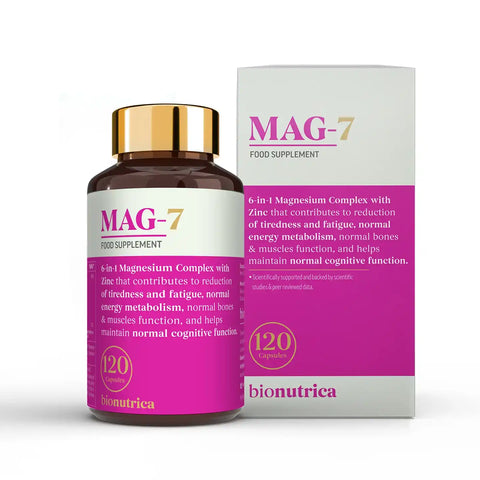Magnesium is an essential mineral responsible for over 300 biochemical reactions in the body, including muscle function, nerve signaling, and energy production. Two of the most popular forms magnesium supplements are Magnesium Glycinate and Magnesium Citrate. But which one is better for you? Let's explore their differences.
Comparison Table: Magnesium Glycinate vs. Magnesium Citrate
| Feature | Magnesium Glycinate | Magnesium Citrate |
|---|---|---|
| Absorption | Highly bioavailable, easily absorbed | Moderate absorption acts as a laxative |
| Digestive Effects | Gentle on the stomach | May cause loose stools or diarrhea |
| Best For | Anxiety, sleep, muscle relaxation | Constipation, digestive health |
| Side Effects | Minimal side effects | May cause digestive discomfort |
Which is better to take, magnesium citrate or magnesium glycinate?
Both magnesium citrate and magnesium glycinate are highly bioavailable forms, but each is tailored to different needs. Magnesium citrate is best for digestive support, constipation and a quick magnesium boost. It draws water into the intestines, acting as a mild laxative. However, it can cause loose stools and dehydration in sensitive individuals.
Magnesium glycinate is gentle on the stomach and prized for its calming effects, making it better for stress relief, sleep, and muscle relaxation. Glycine, an amino acid bound to magnesium, supports neurotransmitter balance and restful sleep, with little risk of digestive upset.
Both forms absorb well, but glycinate is preferred for long-term use, especially when there are anxiety, insomnia, or muscle tension concerns. Ultimately, the choice depends on your health goals and tolerance.
Does magnesium glycinate work immediately?
Magnesium glycinate does not produce immediate effects for most people; The benefits for stress and sleep can begin within a few hours to a few days, but continuous improvement often requires 1-4 weeks of consistent use. Quick results occur mainly in people with existing deficiencies. For best results, regular daily supplementation is recommended, along with adjustments to individual lifestyle or health needs.
Why is Magnesium Glycinate Better?
Magnesium Glycinate is a highly bioavailable form of magnesium, meaning it is easily absorbed by the body. It is bound to glycine, an amino acid that promotes relaxation and has calming effects.
- Better Absorption: Studies suggest that Magnesium Glycinate has superior absorption compared to other forms of magnesium (source).
- Gentle on the Stomach: Unlike Magnesium Citrate, it does not cause digestive discomfort or act as a laxative.
-
Supports Mental Health: Magnesium Glycinate is often recommended for anxiety, stress, and sleep disorders.
Why choose Magnesium Citrate?
Magnesium citrate is best chosen for its high absorption and key digestive benefits, especially for relieving occasional constipation and supporting regularity. Its gentle laxative effect draws water into the intestines, making it useful for those struggling with sluggish intestines or preparing for medical procedures.
Additionally, it helps regulate muscle and nerve function, strengthens bones, and supports heart health by maintaining normal blood pressure and rhythm. It is a popular choice for quickly increasing magnesium levels and reducing minor digestive issues without drastic side effects, although long-term use should be monitored.
What is the healthiest type of magnesium to take?
The healthiest type of magnesium depends on your needs, but magnesium glycinate and magnesium citrate are widely recommended for their high absorption and gentle digestive effects.
Magnesium glycinate is ideal for people with sensitive stomachs who want sleep, stress, or muscle support. This reduces the chances of diarrhea. Magnesium citrate absorbs well and is suitable for those who need constipation relief or a quick magnesium boost.
Magnesium Depends on your Health needs:
- For Relaxation & Sleep: Magnesium Glycinate is the best choice due to its calming effects.
- For Digestive Health: Magnesium Citrate acts as a natural laxative and helps with constipation.
-
For General Well-being: Both forms are beneficial, but Magnesium Glycinate is preferred for overall daily supplementation.
How Much Magnesium Do I Need?
The recommended daily allowance (RDA) for magnesium varies based on age, gender, and health conditions. Below are general guidelines:
- Men (19-30 years): 400 mg per day
- Women (19-30 years): 310 mg per day
- Men (31+ years): 420 mg per day
- Women (31+ years): 320 mg per day
-
Pregnant Women: 350-360 mg per day
These values are general recommendations. Always consult a healthcare provider before taking supplements.
Can magnesium glycinate harm the liver?
Magnesium glycinate is generally safe for the liver and, in fact, may support liver health by helping to regulate inflammation and metabolic processes. Research shows that magnesium supplementation can preserve liver function and slow down the progression of liver disease.
It usually does not damage the liver unless taken in excessive doses by people with severe kidney impairment, which can result in toxicity due to poor magnesium excretion. For most healthy individuals, magnesium glycinate is well-tolerated and does not negatively affect liver enzymes or liver health when used in recommended doses.
Who should avoid magnesium glycinate?
Individuals with severe renal impairment should avoid magnesium glycinate, as compromised kidney function can lead to dangerous magnesium buildup and toxicity. People with allergies to magnesium or its ingredients should also steer clear of it.
People with certain neuromuscular diseases, such as myasthenia gravis, as well as those taking medications such as certain antibiotics, bisphosphonates, diuretics, or proton pump inhibitors, should consult a healthcare provider due to the risks of interactions.
It is important for children and anyone at risk of overdose to be monitored, as excessive magnesium can cause heart disturbances, low blood pressure, or severe gastrointestinal effects.
Conclusion:
Choosing between Magnesium Glycinate and Magnesium Citrate depends on your individual health needs. It stands out for its high absorption rate, gentle effect on the stomach, and calming benefits, making it ideal for stress relief, better sleep, and mental well-being. On the other hand, Magnesium Citrate is more suitable for those dealing with constipation or digestive issues.





